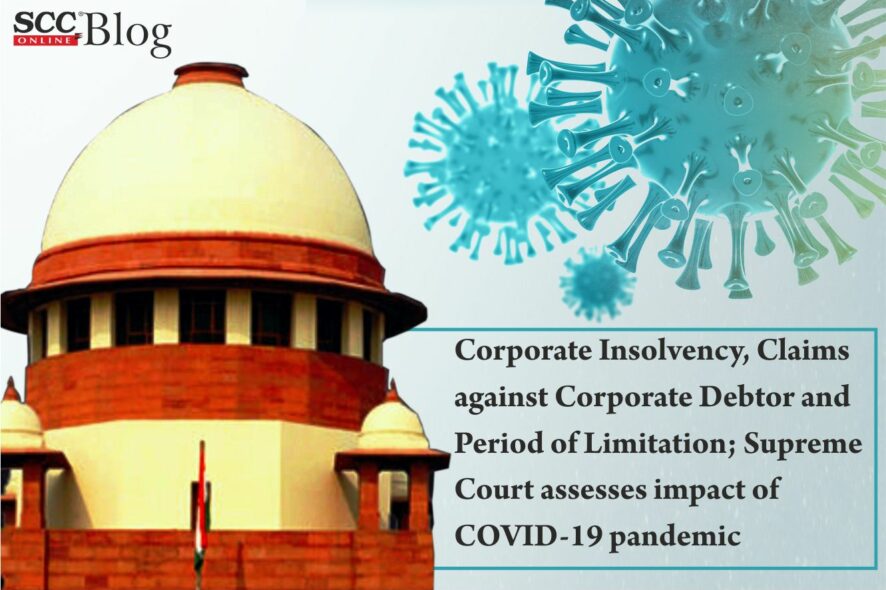Supreme Court: In a case relating to Corporate Insolvency, the Division Bench comprising of Indira Banerjee* and J.K. Maheshwari, JJ., quashed the order of NCLAT rejecting the application under S. 60(5) of IBC. The Bench held that the NCLAT and NCLT had failed to consider the law laid down by the Court with regard to extension of limitation period due to Covid-19 pandemic.
The appeal was filed under Section 62 of the Insolvency and Bankruptcy Code 2016 (IBC) against a judgment and order of NCLAT, whereby it had dismissed the application assailing order of NCLT under Section 61 of the IBC, mainly on the ground that the Resolution Process had already been approved by the Committee of Creditors.
The Appellant, an entity indulged in business of Supply and Erection of Piping Systems had entered into a contract with the Rohit Ferro Tech Ltd.-Corporate Debtor, who contacted the Appellant and placed a Purchase Order for design, supply, erection and testing of LP piping system and the commissioning of an LDO (Light Diesel Oil) storage handling system for its IX 67.5 MW Power Plant (Unit-II) for a consideration of Rs.5,37,75,761 excluding taxes and duties. Subsequently, the Corporate Debtor amended the said purchase order to include additional work of the value of Rs.88,64,239 excluding taxes and duties.
Arbitral Award
Some dispute arose between the parties due to failure and negligence of the Corporate Debtor to pay a sum of Rs.76,85,472 in connection with the said purchase order, pursuant to which the appellant invoked the Arbitration Clause and an Arbitrator was appointed by the High Court of Calcutta. The Arbitrator decided the case in favour of the appellant declaring that the claimant-appellant shall be awarded a sum of Rs.55,01,661 along with interest at the rate of two percent higher than the current rate of interest prevalent on the date of the award on and from 08-08-2014 till the date of payment. Further, the costs at Rs. 5,00,000 was also awarded to the claimant-appellant.
Initiation of CIRP
However, the said award was challenged before the Trial Court by the appellant under Section 34 of the Act, 1996. Meanwhile, the respondent 2, namely State Bank of India being a Financial Creditor of the Corporate Debtor, filed an application before the NCLT under Section 7 of the IBC, for initiation of Corporate Insolvency Resolution Process (CIRP) against the Corporate Debtor, and one Supriyo Chaudhuri was appointed as Resolution Professional.
Covid-19 and Countrywide Lockdown
The grievance of the appellant was that due to the COVID-19 pandemic and subsequent imposition of countrywide lockdown, it was not aware of the initiation of CIRP against the Corporate Debtor till 27-11-2020 whereafter it came to know the Corporate Debtor had not been taking steps in the Arbitration Proceedings in view of Insolvency process initiated against it.
IBC and Period of Limitation
The appellant’s claim of Rs.1,13,38,651, filed under Regulation 7 of the Insolvency and Bankruptcy Board of India (Insolvency Process for Corporate Persons) Regulations 2016 against the Corporate Debtor was rejected by the Resolution Professional on the ground that it had been filed beyond time. It was this order of the Resolution Professional which was being assailed before NCLT and NCLAT and which was being impugned in the instant appeal.
The Bench observed that the NCLT had failed to consider the order of the Supreme Court in Cognizance For Extension of Limitation: In Re, (2021) 5 SCC 452, wherein, taking cognizance of the situation arising out of the challenge faced by the country on account of Covid-19 Virus and resultant difficulties that may be faced by litigants across the country the Supreme Court had ordered that for the purpose of counting period of limitation in all proceedings, irrespective of the limitation prescribed under the general law or Special Laws whether condonable or not the period from 15-03-2020 till 14-03-2021 shall stand excluded. The Court had further declared that in cases where the limitation would have expired during the period between 15-03-2020 till 14-03-2021, notwithstanding the actual balance period of limitation remaining, all persons shall have a limitation period of 90 days from 15-03-2021.
Therefore, noticing that the NCLAT had also failed to consider the order of the Court extending period of limitation, the Bench held that since the appellant was required to file its claim within 3 months from 11-02-2020, and the appellant actually filed claim well before 14-01-2021, the claim ought not to have been rejected in the light of the above mentioned order.
Conclusion
In the backdrop of above, the Bench held that the NCLAT erred in dismissing the appeal without even considering the effect and impact of the orders of the Court in Cognizance For Extension of Limitation: In Re. Accordingly, the appeal was allowed and the impugned judgment and orders of NCLAT and NCLT were set aside. The application of the appellant under Section 60(5) of the IBC was allowed.
[GPR Power Solutions (P) Ltd. v. Supriyo Chaudhuri, 2021 SCC OnLine SC 1328, decided on 29-11-2021]
*Judgment by: Justice Indira Banerjee
Appearance by:
For Appellant(s): Sumit Kumar, AOR, Rajesh Pathak, Kumari Supriya, Abhishek Chakraborty, Hemant Kumar and Harshita Sinha, Advocates
For Respondent(s): Indranil Ghosh, Orijit Chatterjee, Swati Dalmial, Palzer Moktan, Ojasa Arya, Akash Yadav, Advocates
Satya Mitra, AOR, Swarnendu Chatterjee, AOR and Naman Kamdar, Advocate
Report by: Kamini Sharma, Editorial Assistant






